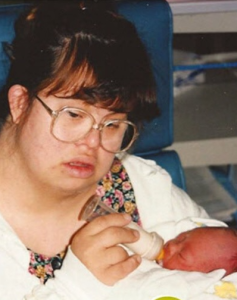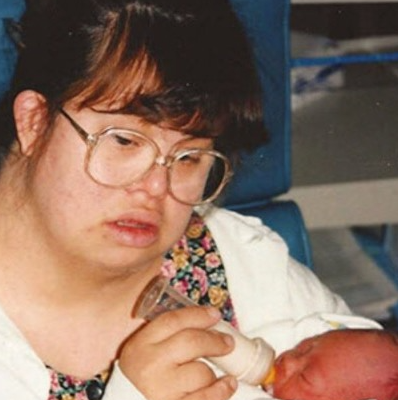Couple with Down Syndrome Decide to Have Children, Face Criticism
When love blooms, it does not discriminate—it doesn’t ask about chromosomes, differences, or societal approval. It simply grows. For one couple with Down syndrome, love not only blossomed but also matured into the desire to start a family. Their decision, however, has ignited a storm of opinions, support, and criticism.
Love Beyond Expectations
The couple—let’s call them Daniel and Maria—met at a community center for individuals with disabilities. Both were in their early twenties, full of optimism, humor, and an unshakable sense of connection. What began as friendship soon deepened into something more.
“They just lit up around each other,” Maria’s mother shared. “It was as if they had been waiting their whole lives to find someone who truly understood them.”
Their bond was tender but determined. Like many couples, they dreamed of moving in together, building a life, and eventually, raising children.
Facing Doubts from the Start
From the moment they announced their intention to have kids, the reactions varied dramatically. Supporters cheered their autonomy and right to make decisions about their own lives. Critics, however, raised concerns about genetics, parenting ability, and social responsibility.
“People underestimate individuals with Down syndrome,” said Daniel’s older brother. “Yes, they may need extra support, but that doesn’t mean they don’t deserve the chance to experience family life like everyone else.”
Still, others weren’t as kind. Online discussions erupted with harsh comments questioning their competence. Some went as far as to suggest their decision was “irresponsible” or “selfish.”
The Science and Concerns
Medical experts often emphasize the complexity of this issue. Down syndrome, caused by an extra copy of chromosome 21, affects cognitive development and can lead to certain health challenges.
Women with Down syndrome can conceive, but there is a higher likelihood—about 30–50%—that their child will also have Down syndrome. Men with Down syndrome, meanwhile, are typically less fertile, though not always infertile.
Critics argue that these risks, coupled with the challenges of parenting, mean couples with Down syndrome may face more hurdles than most. However, disability rights advocates counter that the same concerns can be said for countless other conditions—yet people are not prevented from becoming parents based on genetics or health alone.
Autonomy vs. Protection
This debate touches on one of the most delicate ethical questions: where is the line between protecting vulnerable individuals and respecting their autonomy?
Historically, people with disabilities were stripped of their rights to marry or have children. In the early 20th century, forced sterilizations were common in many countries, justified by a misguided belief in “protecting society.” Such practices left deep scars in the disability community.
Today, advocates stress that denying individuals with Down syndrome the right to become parents perpetuates discrimination. Instead of blanket assumptions, they argue for individualized support—evaluating each couple’s abilities and providing resources where needed.
Voices from the Community
The couple’s decision has sparked conversations among families, advocacy groups, and within the Down syndrome community itself.
“I have a daughter with Down syndrome,” one parent commented. “People said she would never live independently, but she proved them wrong. Why should we assume she can’t be a mother one day?”
Another parent took a different view: “I love my son more than anything, but I know the daily challenges he faces. Parenting is difficult even for people without disabilities. I worry that society would judge him unfairly if he tried.”
The Couple’s Perspective
Amid the controversy, Daniel and Maria have remained remarkably grounded. In interviews, they speak candidly about their dreams and their awareness of the challenges.
Maria explained: “People think we don’t understand, but we do. We know having a baby is hard. But we want to love them, to give them hugs, to make them laugh. That’s what family means.”
Daniel added: “Everyone tells us what we can’t do. But we believe in what we can do. We can love. We can care. We can try.”
Their words are simple but profound—a reminder that at the core of parenting is love, patience, and commitment.
Support Systems Make a Difference
Experts agree that the success of such parenting journeys often depends on community and family support. Extended families, social workers, and disability services can provide guidance, helping the couple navigate challenges in child-rearing, finances, and health.
One social worker involved with couples in similar situations said: “The question isn’t always whether they can parent independently. The real question is: can they parent with support? And in many cases, the answer is yes.”
Indeed, many children are raised in environments where grandparents, siblings, and community members play active roles. Parenting is rarely done alone.
The Broader Conversation
This story has gone beyond Daniel and Maria—it’s forcing society to confront uncomfortable questions.
-
Should people with intellectual disabilities be allowed to make reproductive choices freely?
-
Is it fair to judge their abilities by comparing them to societal “norms”?
-
At what point does concern for the child cross over into discrimination against the parents?
For disability rights activists, the answer is clear: reproductive rights are human rights. The moment we start restricting who “deserves” to have children, we tread dangerously close to repeating historical injustices.
Reimagining Parenthood
Parenthood comes in many forms. Some parents struggle with poverty, illness, or mental health challenges. Others thrive despite obstacles because of resilience and support systems. For Daniel and Maria, the dream of having children is not about perfection—it is about love and belonging.
Their story pushes society to redefine what makes someone a “good parent.” Is it wealth? Education? Intelligence? Or is it the willingness to nurture, to show patience, and to love unconditionally?
Final Thoughts
The journey of Daniel and Maria is far from simple, and the criticisms they face are not without weight. Parenting with Down syndrome does present unique challenges. Yet, at the heart of the debate is a fundamental truth: every human being deserves dignity, respect, and the right to make choices about their own lives.
The couple may face obstacles, but they also embody courage. Their story is a reminder that love cannot be measured by chromosomes or societal expectations. Love is love—and it deserves to be recognized.
Whether the world agrees with their decision or not, Daniel and Maria are challenging all of us to rethink our assumptions about ability, family, and the right to dream.


